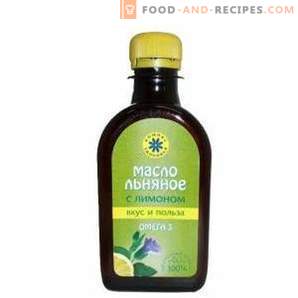
The ratio of olive oil to all is different. If some consider it just a fashionable product, then in the Mediterranean countries it is added to almost all dishes. After all, it is in Greece, Italy, Spain that olive trees grow, from the fruit of which they squeeze oil.
Useful Properties
Despite the high cost of olive oil, the locals use it in large quantities. It can be seen, therefore, they do not suffer due to high blood cholesterol or cardiovascular diseases. The fact is that olive oil contains unsaturated fatty acids, which strengthen the walls of blood vessels, and at the same time cleanse them.
In addition, the oil is rich in beneficial micronutrients and vitamins. If you use oil regularly, the blood sugar level, bad cholesterol, and biliary tract are reduced.
But still you should not treat it as a panacea and argue that it is more useful than other vegetable oils.
If you compare olive oil with other vegetable oils, you can see that in flaxseed omega-3 unsaturated fatty acids are more. And vitamin E in olive less than in sunflower.
But if you still use olive oil for food, you need to know that it can be of different quality, which depends on the method of processing.
Common types of olive oil
- Extra virgin olive oil. The most useful and expensive olive oil, which is produced by cold pressing of the highest quality fruit. This oil retains all the beneficial substances that are in fresh olives, as well as their taste and smell. It is believed that the fatty acids of this oil are similar in composition to the fats contained in human milk. That it is best suited for salads and other dishes.
- Fine virgin olive oil. This oil is produced from inferior olives, but also by cold pressing. It differs from the premium oil less pronounced aroma.
- Olive oil. This oil is refined, with a small percentage of natural olive oil cold pressed. Almost odorless, so suitable for frying, as well as for dressing salads. It does not change the taste of products, so it can be added to any dish.
How to choose a quality product
- Olive oil has a short shelf life, so first read the information on the label. It should have the date of not only the production, but also the bottling, as well as the firm responsible for the quality of the product. Do not buy oil, the shelf life of which is coming to an end.
- If you are not sure about the quick use of oil, you should not buy it in a large container, as its useful properties decrease dramatically over time.
- It is impossible to determine its quality by the color of the oil, because it can be both yellow-brown and yellow-green. It depends on the place of olive growth, variety, ripeness of fruits and their processing.
How to store olive oil correctly
The quality of the product is influenced not only by the method of its processing, but also by the storage conditions: light, temperature, air, and also the container into which it is poured.
Temperature
Many, having bought a bottle of olive oil, immediately put it in the refrigerator, thinking that only there it will be safe and sound. But after a few days, it is noticed that the clear and liquid oil suddenly thickened, and an incomprehensible type of flakes and sediment appeared at the bottom. Then the question immediately arises of what it is and whether it is possible to eat such a product. In fact, such a metamorphosis that occurs with chilled olive oil does not affect its quality in any way. Unless the appearance is spoiled, but in the salad it does not look very good. And to blame for this solid fats, which are part of the oil.
To return it to its former consistency, it is enough to leave the bottle at room temperature. When the oil is warm, it will take the same form. Some hostesses put the bottle in hot water, thereby speeding up the process. But in this case, the quality of the oil may deteriorate, because the temperature is disturbed.
Bottom line: olive oil is stored at room temperature, but away from heating appliances and a gas stove. The optimal storage temperature is + 14-16 ° C. Such conditions may be in the pantry, basement, built-in closet.
How does light affect storage
If you store olive oil in the light, then undesirable processes begin to occur in it, which deteriorate its quality. It deteriorates and becomes rancid.
Bottom line: the product is stored in a dark place so as not to receive light.
How does air affect storage
If the olive oil is loosely closed and air passes into the bottle, then the process of oxidation occurs and the oil deteriorates. With a tightly closed lid (or even without it), the oil will absorb foreign odors, which will also affect its quality.
Bottom line: the oil should be stored in a well-closed container so that air does not get inside.
What kind of packaging is needed
Manufacturers who monitor the quality of their products also care about the capacity in which the oil is poured.
High-quality olive oil produced in glass bottles or tin containers with a well-lapped lid. Do not store oil in plastic or iron containers, so that an undesirable chemical reaction does not occur.
If the oil runs out, and the bottle is large, it is necessary to pour it into a smaller container in order to exclude the filling of empty space with air.
Total: Olive oil is stored in a glass bottle made of dark glass or in a stainless steel container with a well-closed lid. The volume of the container must match the amount of oil.
Shelf life of olive oil
Extra virgin olive oil can be stored for about a year. The remaining oil is desirable to use within six months.
Mistress of the note
- To improve the taste of the oil and make it spicy, you can insist on spicy herbs. To do this, use thyme, oregano, basil, marjoram and other spicy plants.
- In order not to open a large container with oil once again, for daily use part of the oil is poured into a smaller container.
- Refined oil is used for frying, as it does not burn or foam. And for dressing salads it is better to take unrefined.























